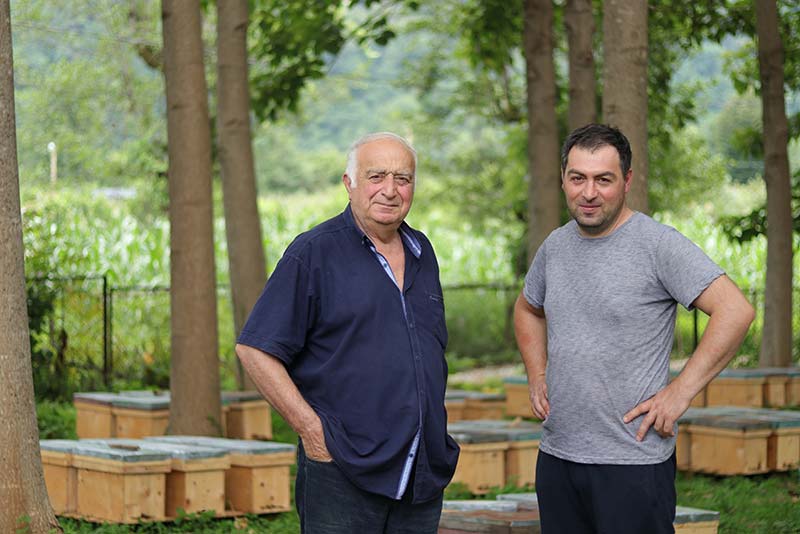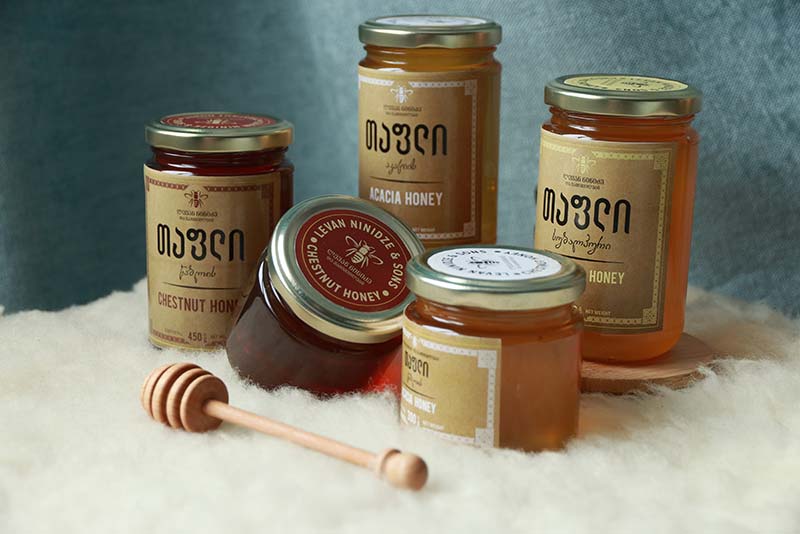- Georgia is looking to leverage its competitive advantage to accelerate agriculture exports.
- IFC worked with the beekeeping sector to help it comply with EU trade rules.
- Honey exports reached a record amid improved testing and more training.
Growing up in a family of beekeepers, Givi Ninidze, a 40-year-old ophthalmologist, was raised with bees. So it was no surprise when in 2004, the successful doctor took over his family’s apiary and honey processing facility. Ninidze’s company now produces several varieties of wild, natural floral honey that are likely to find a market in Europe with the help of IFC.
Georgia’s goal is to accelerate agriculture exports of products of animal origin, unlocking potential in areas where the country has a competitive advantage. Honey is one of them. Although the legal framework with the European Union allowed exports from Georgia, volumes of honey exports to Europe remained low. One of the major barriers was inconsistent safety due to poor beekeeping practices, especially unnecessary application of veterinary pharmaceuticals. More than half of honey samples were contaminated with antibiotic residues in 2017-18, according to a honey monitoring program conducted by Georgia’s National Food Agency.

Givi and Levan Ninidze at their apiary in Georgia.
Around that time, the IFC Georgia Agribusiness Competitiveness Project—implemented in partnership with Sweden’s government agency for development cooperation, SIDA—engaged with the country’s public and private sectors to help boost agricultural exports. The first step was to help ensure business compliance with the Deep and Comprehensive Free Trade Area Agreement with the EU. In collaboration with the Ministry of Environment Protection and Agriculture, the beekeeping sector was chosen for the project’s focus. Being a low risk animal-origin product with a short value chain, honey was likely to comply with the EU food safety regulations within a feasible time frame.
IFC started by supporting beekeepers with training and advisory support, from apiary management to layout planning for a new processing facility. In a combined effort, IFC and Georgia’s National Food Agency also worked to increase awareness among beekeepers. Gradually, the share of contaminated honey dropped significantly—from 56 percent in 2017 to 10 percent in 2019, benefitting not only exports, but also domestic consumers.
Building on this momentum, a local export company—Agro Factory—approached Ninidze, one of the project beneficiaries, in November 2020. At the end of December, more than 10 tonnes of Georgian honey from Ninidze’s company was sent to Italy. Apart from becoming a motivation for honey producers and exporters to explore export opportunities, the deal also contributed to a record amount of honey exported from Georgia. In 2020, honey exports reached over 21 tonnes, according to the National Statistics Office of Georgia, an increase of more than 200 percent from the previous year.

At the end of December 2020, more than 10 tonnes of Georgian honey from Ninidze’s company was sent to Italy.
IFC also worked to help increase the capacity of inspectors and the State Laboratory of Agriculture to test honey for regulated residues. As a result, in 2020, the National Food Agency commissioned the State Laboratory of Agriculture to test honey samples, instead of a lab outside the country that was used in previous years at both higher cost and extended processing times.
In close collaboration with the Ministry of Environment Protection and Agriculture, IFC continues to work on updating Georgian food safety legislation and requirements for the beekeeping and honey processing sector. The project is part of IFC’s regional program that has helped Ukraine and Moldova, among others, increase their agricultural potential.
IFC’s support to Georgia’s honey exports is a pilot effort that is expected to have a spillover effect on other agriculture sectors, spurring producers of other food products of animal origin to improve safety standards. That is especially important for products of animal origin, such as other beekeeping products, like pollen and royal jelly, aquaculture, and dairy. Once those products are accepted for EU import, demand in other markets, such as the Middle East and Asia, is likely to rise.
The first successful honey shipment to Italy by Ninidze’s company has inspired other honey producers and potential exporters to focus on improving practices. Reputable beekeepers have already started receiving inquiries about their products from exporters.
Ninidze is optimistic that once they get a taste, more European buyers will be looking to buy honey from Georgia. “Beekeeping is all about expectation and hope,” he says. “The best part is to see them come true.”
Published in April 2021
